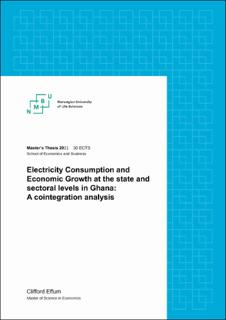| dc.contributor.advisor | Bergland, Olvar | |
| dc.contributor.author | Effum, Clifford | |
| dc.coverage.spatial | Ghana | en_US |
| dc.date.accessioned | 2022-05-03T12:56:30Z | |
| dc.date.available | 2022-05-03T12:56:30Z | |
| dc.date.issued | 2021 | |
| dc.identifier.uri | https://hdl.handle.net/11250/2993962 | |
| dc.description.abstract | This thesis examines the relationship between electricity consumption and economic growth in Ghana both at the state and sectoral level in Ghana. It considers GDP as well as the value-added of the major sectors in the economy of Ghana with the corresponding amount of electricity consumed by these sectors from 2000 to 2020. These sectors are the industry, service and agriculture sectors. The Augmented Dickey-Fuller test was used as the test of stationarity in the time series data while the Johansen cointegration test was conducted to ascertain whether there was long-run relationship among the variables. The vector autoregressive (VAR) model was used to determine the direction of causality between the variable where are the Granger causality test was used to determine whether past values of electricity consumption contained useful information in predicting economic growth in Ghana.
The findings revealed that cointegration was evident only at the state level but same could not be found at the disaggregated levels. From the VAR model, it was found that there is a unidirectional causality running from economic growth to electricity consumption in Ghana whereas no significant direction of causality was determined between economic growth and electricity consumption at the sectoral levels. The was a unidirectional Granger causality running from economic growth to electricity consumption at the state level and the services sector. This is an indication that lagged values of GDP was useful in predicting electricity consumption both at the national level and services sector. However, there was no direction of Granger causality running from electricity consumption and economic growth in the industry and agriculture sectors.
Electricity conservative practices are recommended in Ghana. This is because economic growth has been found to influence electricity consumption and not the other way round. | en_US |
| dc.language.iso | eng | en_US |
| dc.publisher | Norwegian University of Life Sciences, Ås | en_US |
| dc.rights | Attribution-NonCommercial-NoDerivatives 4.0 Internasjonal | * |
| dc.rights.uri | http://creativecommons.org/licenses/by-nc-nd/4.0/deed.no | * |
| dc.subject | Electricity consumption | en_US |
| dc.subject | Economic growth | en_US |
| dc.title | Electricity consumption and economic growth at the state and sectoral levels in Ghana : a cointegration analysis | en_US |
| dc.type | Master thesis | en_US |
| dc.subject.nsi | VDP::Social science: 200 | en_US |
| dc.description.localcode | M-ECON | en_US |

